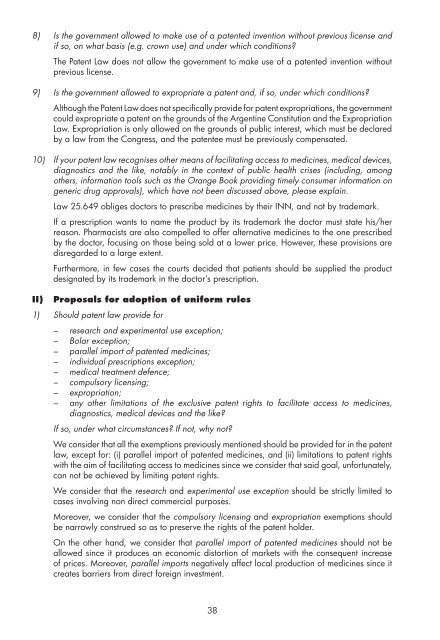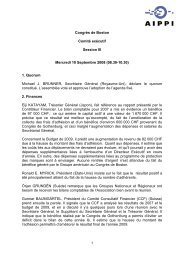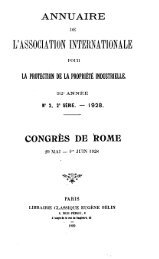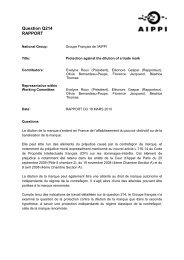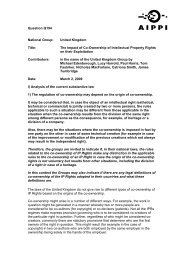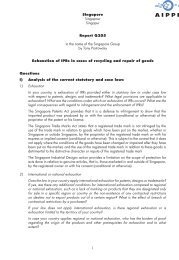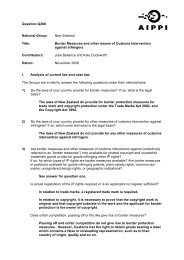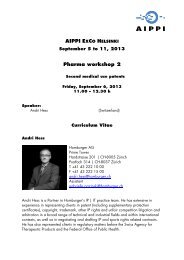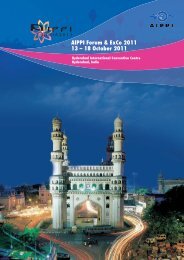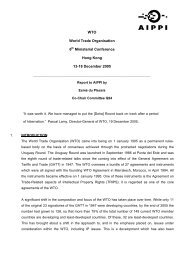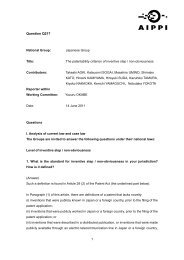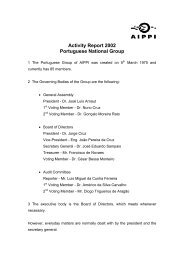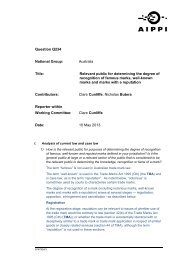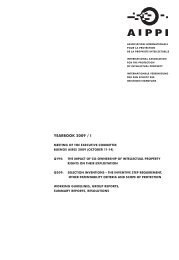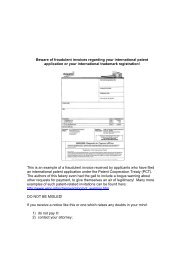- Page 1 and 2: YEARBOOK 2008 / I XXXXI TH CONGRESS
- Page 3 and 4: XXXXI TH CONGRESS OF AIPPI BOSTON,
- Page 5 and 6: I. THE QUESTIONS ON THE AGENDA LES
- Page 7 and 8: The Questions on the Agenda On the
- Page 9 and 10: II. QUESTION Q202 THE IMPACT OF PUB
- Page 11 and 12: Working Guidelines by Jochen E. Bü
- Page 13 and 14: 10) At the Congress of Montreal in
- Page 15 and 16: The requirement that a licence be v
- Page 17 and 18: - expropriation; - any other limita
- Page 19 and 20: Orientation de Travail* par Jochen
- Page 21 and 22: 8) Dans la résolution Q101 (Import
- Page 23 and 24: limitée aux médicaments (et soumi
- Page 25 and 26: 5) Prière de ne répondre à cette
- Page 27 and 28: Arbeitsrichtlinien* von Jochen E. B
- Page 29 and 30: 8) In Entschliessung Q101 (Parallel
- Page 31 and 32: Parallelimport-Ausnahmen vor, jedoc
- Page 33 and 34: 5) Bitte beantworten Sie diese Frag
- Page 35 and 36: Questions Argentina Argentine Argen
- Page 37: Yes, compulsory licenses are availa
- Page 41 and 42: Questions Australia Australie Austr
- Page 43 and 44: 3) Are parallel imports of patented
- Page 45 and 46: An examination of the circumstances
- Page 47 and 48: If the patentee and the Commonwealt
- Page 49 and 50: The Australian Group considers that
- Page 51 and 52: Questions Austria Autriche Österre
- Page 53 and 54: 7) Has new Article 31bis TRIPS been
- Page 55 and 56: Questions Belgium Belgique Belgien
- Page 57 and 58: The rule that patent rights shall b
- Page 59 and 60: drugs to developing countries which
- Page 61 and 62: ase nationale. Pour cette raison le
- Page 63 and 64: Questions Brazil Brésil Brasilien
- Page 65 and 66: obtained by Nortox Agro-Química S/
- Page 67 and 68: une infraction de brevet. L’excep
- Page 69 and 70: Questions Bulgaria Bulgarie Bulgari
- Page 71 and 72: 9) Is the government allowed to exp
- Page 73 and 74: Questions Canada Canada Kanada Repo
- Page 75 and 76: seeking to copy a patented innovati
- Page 77 and 78: If the patent is deemed to be abuse
- Page 79 and 80: Terms of use 2) Subject to section
- Page 81 and 82: Questions China Chine China Report
- Page 83 and 84: 1) Where any entity which is qualif
- Page 85 and 86: a view to implementing the WTO deci
- Page 87 and 88: Questions Colombia Colombie Kolumbi
- Page 89 and 90:
Article 61 - At the expiry of a per
- Page 91 and 92:
importation or exportation of pharm
- Page 93 and 94:
Questions Denmark Danemark Dänemar
- Page 95 and 96:
swiss pharmaceutical company J.R. G
- Page 97 and 98:
The Danish group rejects the genera
- Page 99 and 100:
Questions Ecuador Equateur Ecuador
- Page 101 and 102:
A compulsory license shall be grant
- Page 103 and 104:
II) Proposals for adoption of unifo
- Page 105 and 106:
Questions Egypt Egypte Ägypten Rep
- Page 107 and 108:
The compulsory license shall be iss
- Page 109 and 110:
5) The party to whom the compulsory
- Page 111 and 112:
- National security, health, enviro
- Page 113 and 114:
Questions Estonia Estonie Estland R
- Page 115 and 116:
- any other limitations of the excl
- Page 117 and 118:
Questions Finland Finlande Finnland
- Page 119 and 120:
Compulsory licenses have not been g
- Page 121 and 122:
Résumé en Finlande, la loi sur br
- Page 123 and 124:
France France Frankreich Rapport Q2
- Page 125 and 126:
Par un jugement en date du 20 févr
- Page 127 and 128:
législation d’un Etat membre ne
- Page 129 and 130:
Le droit communautaire ayant posé
- Page 131 and 132:
La réalisation de ces actes consti
- Page 133 and 134:
- le demandeur devra justifier qu
- Page 135 and 136:
7) L’article 31 bis TRIPS a-t-il
- Page 137 and 138:
Le propriétaire du brevet est info
- Page 139 and 140:
L’article L 3131-5 du même code
- Page 141 and 142:
toute mesure destinée à prévenir
- Page 143 and 144:
the general knowledge, but does not
- Page 145 and 146:
Die Europäische Gemeinschaft hat i
- Page 147 and 148:
Questions Germany Allemagne Deutsch
- Page 149 and 150:
3) Are parallel imports of patented
- Page 151 and 152:
forward as a defense against a pate
- Page 153 and 154:
order may be issued if the inventio
- Page 155 and 156:
II) Proposals for adoption of unifo
- Page 157 and 158:
it has to be considered that effect
- Page 159 and 160:
Germany Allemagne Deutschland Frage
- Page 161 and 162:
auch Versuche mit innovativen Arzne
- Page 163 and 164:
unten zu Frage 7). Bislang sind in
- Page 165 and 166:
Entschädigung zahlen. Die Wiederei
- Page 167 and 168:
mit urteil vom 04. Mai 1972 („Ker
- Page 169 and 170:
der armen Länder sowie die hierdur
- Page 171 and 172:
constitue une atteinte profonde aux
- Page 173 and 174:
Questions Hungary Hongrie Ungarn Re
- Page 175 and 176:
According to the Hungarian Patent A
- Page 177 and 178:
- are part of Hungarian patent law,
- Page 179 and 180:
Questions Indonesia Indonésie Indo
- Page 181 and 182:
- Bolar exception; (Article 135 (b)
- Page 183 and 184:
Questions Ireland Irlande Irland Re
- Page 185 and 186:
Simply put, this doctrine means tha
- Page 187 and 188:
as such. Service of the State is br
- Page 189 and 190:
Questions Israel Israël Israel Rep
- Page 191 and 192:
• In 1989 Agis Ltd. obtained a co
- Page 193 and 194:
Questions Italy Italie Italien Repo
- Page 195 and 196:
On 23 February 2005, the Authority
- Page 197 and 198:
A particular complusory license can
- Page 199 and 200:
Questions Japan Japon Japan Report
- Page 201 and 202:
The Japanese Patent Law has no “B
- Page 203 and 204:
5) Please answer this question only
- Page 205 and 206:
The provisions for awarding a non-e
- Page 207 and 208:
ut it should be provided within the
- Page 209 and 210:
license) was issued for the import
- Page 211 and 212:
Questions Malaysia Malaisie Malaysi
- Page 213 and 214:
) where the patent is granted in re
- Page 215 and 216:
Questions Mexico Mexique Mexiko Rep
- Page 217 and 218:
scope of the license, and the amoun
- Page 219 and 220:
Il serait souhaitable d´ avoir un
- Page 221 and 222:
Netherlands Pays-Bas Niederlande Re
- Page 223 and 224:
summary: No, the current Dutch Pate
- Page 225 and 226:
8) Is the government allowed to mak
- Page 227 and 228:
Questions Norway Norvège Norwegen
- Page 229 and 230:
Under the Civil Defense Act, the Mi
- Page 231 and 232:
Questions Peru Pérou Peru Report Q
- Page 233 and 234:
license in reasonable conditions, a
- Page 235 and 236:
the population has limited access t
- Page 237 and 238:
Questions Philippines Philippines P
- Page 239 and 240:
It may be instructive to likewise s
- Page 241 and 242:
8) Is the government allowed to mak
- Page 243 and 244:
9) Is the government allowed to exp
- Page 245 and 246:
Questions Portugal Portugal Portuga
- Page 247 and 248:
That is to say, exhaustion of the r
- Page 249 and 250:
though there are no practical cases
- Page 251 and 252:
In order both to resolve the abovem
- Page 253 and 254:
Questions Republic of Korea Républ
- Page 255 and 256:
If so, please provide details, incl
- Page 257 and 258:
Questions Singapore Singapour Singa
- Page 259 and 260:
• the name and particulars of the
- Page 261 and 262:
Questions South Africa Afrique du S
- Page 263 and 264:
This aspect was considered by the H
- Page 265 and 266:
c) where trade or industry in South
- Page 267 and 268:
It is also important to recognise t
- Page 269 and 270:
Spain Espagne Spanien Report Q202 i
- Page 271 and 272:
the Spanish Patent act foresees the
- Page 273 and 274:
- parallel import of patented medic
- Page 275 and 276:
c) dépendance entre brevets d) Exi
- Page 277 and 278:
Sweden Suède Schweden Report Q202
- Page 279 and 280:
are substantially related to the re
- Page 281 and 282:
very special reasons. In the litera
- Page 283 and 284:
prices for the generic drug to the
- Page 285 and 286:
L’harmonisation des exceptions de
- Page 287 and 288:
Questions Switzerland Suisse Schwei
- Page 289 and 290:
in light of Swiss antitrust legisla
- Page 291 and 292:
- expropriation; the Swiss group is
- Page 293 and 294:
ist. Versuche im Hinblick auf einen
- Page 295 and 296:
Questions Thailand Thaïlande Thail
- Page 297 and 298:
- that the patented product has not
- Page 299 and 300:
from the date of grant of license,
- Page 301 and 302:
Questions Turkey Turquie Türkei Re
- Page 303 and 304:
On the other hand, as thoroughly ex
- Page 305 and 306:
is not allowed although customs uni
- Page 307 and 308:
erstens durch die Behauptung begrü
- Page 309 and 310:
United Kingdom Royaume-Uni Vereinig
- Page 311 and 312:
Medical treatment methods are not i
- Page 313 and 314:
ss.55-59 PA 77 provide in effect fo
- Page 315 and 316:
It would be useful if such rules we
- Page 317 and 318:
Questions United States of America
- Page 319 and 320:
7) Has new Article 31bis TRIPS been
- Page 321 and 322:
Summary Report Question Q202 The im
- Page 323 and 324:
France and Germany the Bolar except
- Page 325 and 326:
country for the domestic manufactur
- Page 327 and 328:
In Brazil two compulsory licenses h
- Page 329 and 330:
The Bulgarian and Spanish Groups st
- Page 331 and 332:
Individuals prescriptions exception
- Page 333 and 334:
3) Should any of the limitations of
- Page 335 and 336:
Rapport de Synthèse* Question Q202
- Page 337 and 338:
sont membres de l’Union Européen
- Page 339 and 340:
Une exception pour les prescription
- Page 341 and 342:
Le droit américain des brevets pr
- Page 343 and 344:
8) Votre gouvernement est-il autori
- Page 345 and 346:
Portugal, République de Corée, Ro
- Page 347 and 348:
Certains Groupes (Argentine, Bulgar
- Page 349 and 350:
Certains Groupes (Brésil, Portugal
- Page 351 and 352:
Zusammenfassender Bericht Frage Q20
- Page 353 and 354:
Mitgliedsstaaten der Europäischen
- Page 355 and 356:
4) Ist in Ihrem Patentrecht eine Au
- Page 357 and 358:
Peru, Portugal, den Philippinen, de
- Page 359 and 360:
In den meisten berichterstattenden
- Page 361 and 362:
- Irgendwelche anderen Beschränkun
- Page 363 and 364:
Die Gruppe aus Australien (das das
- Page 365 and 366:
Die mexikanische Gruppe merkt an, d
- Page 367 and 368:
AIPPI Resolution Question Q202 The
- Page 369 and 370:
6) Concerning public health: a) the
- Page 371 and 372:
AIPPI Observant que: Résolution Qu
- Page 373 and 374:
5) Dans la mesure où le droit des
- Page 375 and 376:
AIPPI Feststellend: Entschliessung
- Page 377 and 378:
3) Die Barcelona Entschliessung bet
- Page 379 and 380:
Table of contents Congress (Boston,
- Page 381 and 382:
Table des matières Congrès (Bosto
- Page 383 and 384:
Inhaltsverzeichnis Kongress (Boston


